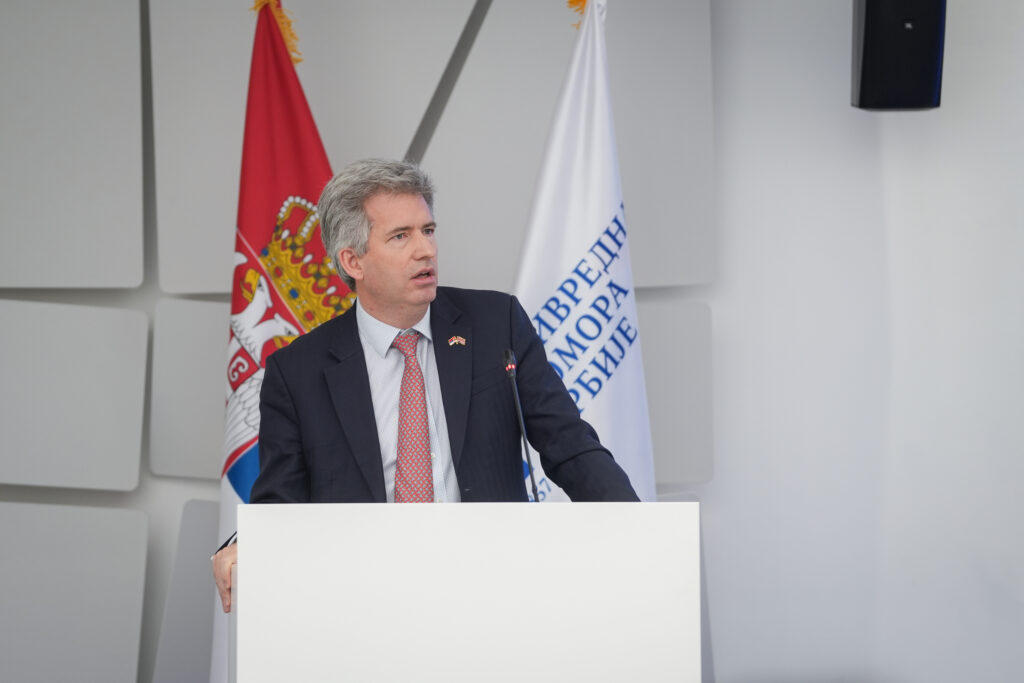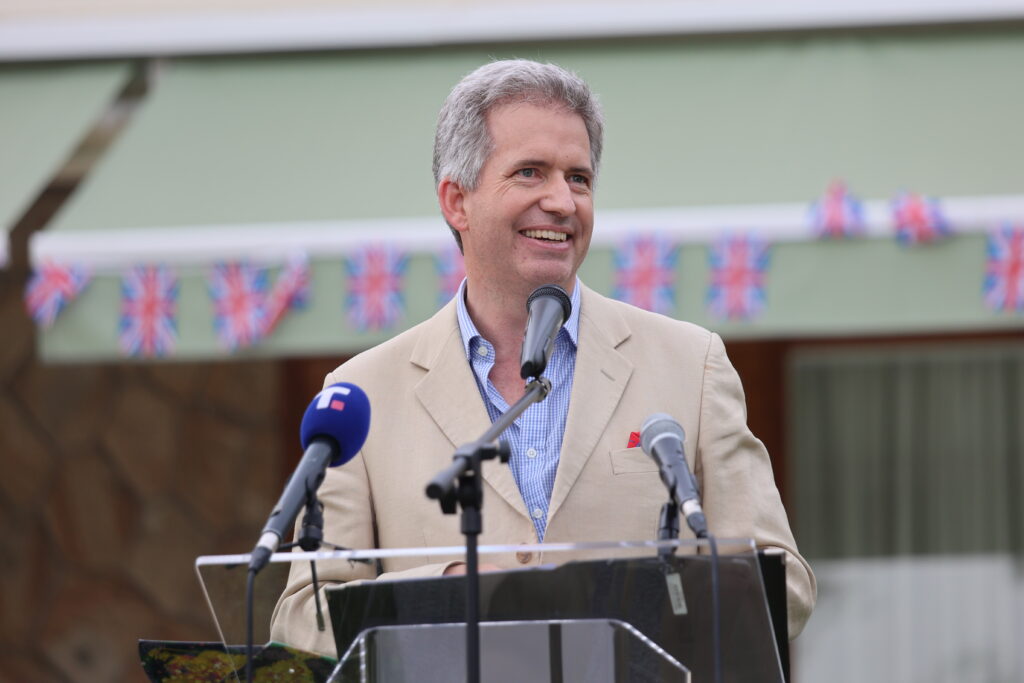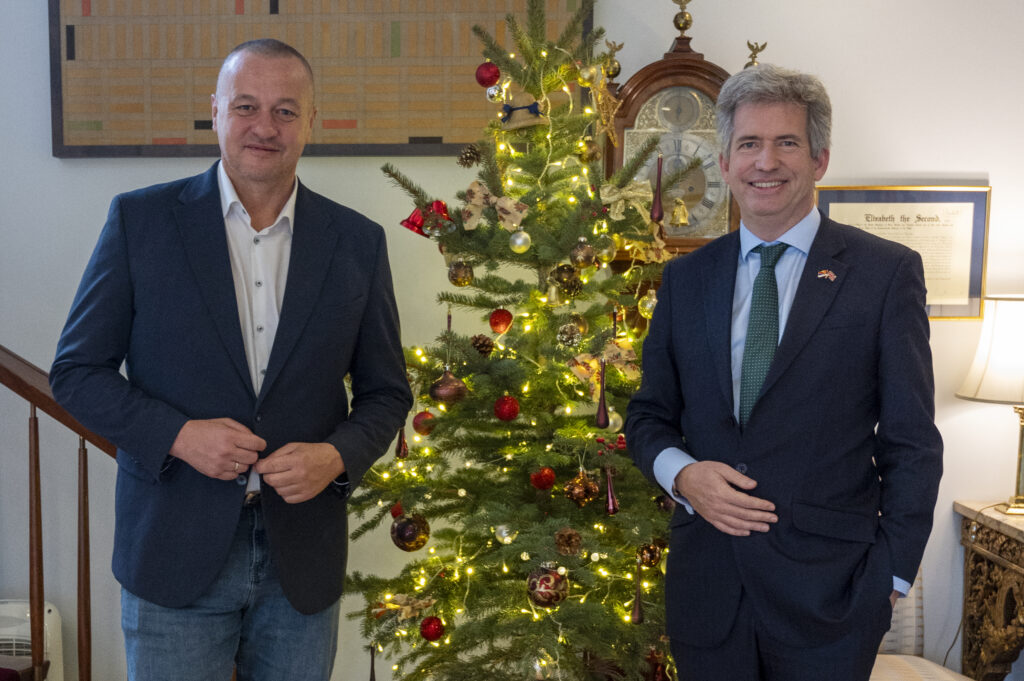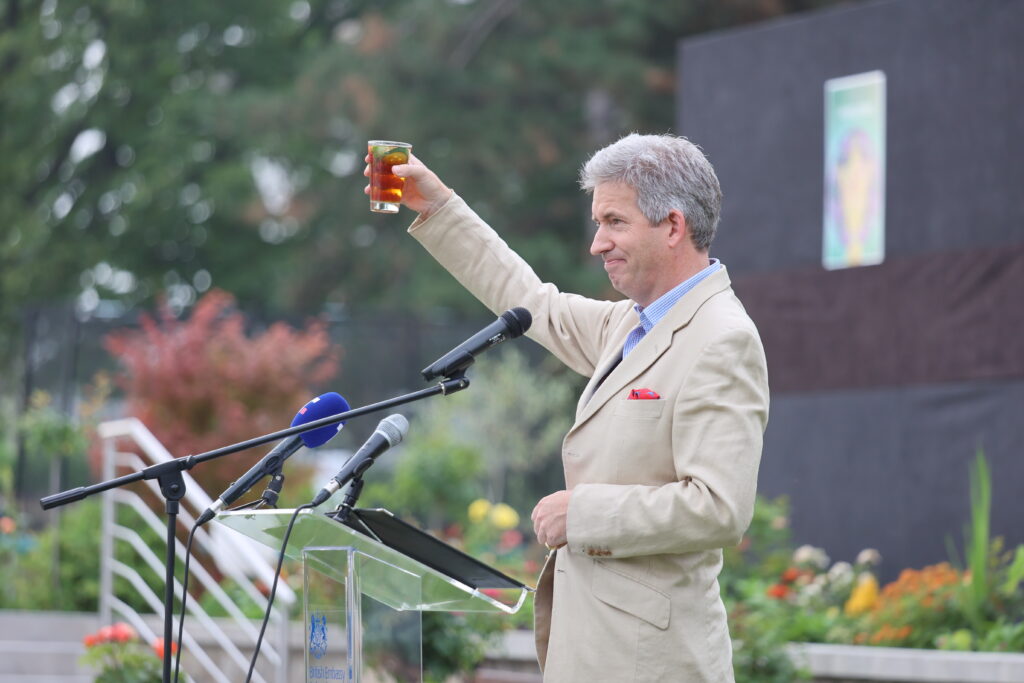Exploring Global Challenges, Partnerships, and Serbia-UK Relations
 By Robert Čoban
By Robert Čoban
The British Ambassador to Serbia, H.E. Edward Ferguson, and his wife Caroline, always smiling, have quickly become favourites among Belgrade’s diplomatic corps members. Observant chroniclers noted that he is the first British ambassador in Belgrade in the past 12 years to have Aleksandar Vučić attend the reception for the British monarch’s birthday. Although he came to our country as the representative of a nation no longer part of the EU, he has been highly active in various areas of Serbian society – from culture to conferences on digital communications.
I spoke with Ambassador Ferguson ahead of Christmas at his residence in Belgrade. As is customary, I sent the questions to the embassy in advance to allow the interviewee to prepare. He agreed to answer all my questions, and readers who listen to the interview on the magazine’s YouTube channel can hear him answer two questions in Serbian, a language he speaks very well.
First, thank you for this pre-Christmas interview at the end of this year. Since you arrived in Belgrade a year and a half ago, have you gotten an impression of Serbian society? What do you value most in Serbian citizens, and what should we change in our habits if we want to progress and be part of the European family of nations?
Well, yes, I mean, I’ve been in Serbia for about a year and a half now. And most of the time, most days, we feel very, very lucky and very, very happy to be here. As you may know, we lived in Bosnia-Herzegovina for four years. So this is our second time in this part of the world.
This is how you learned so good Serbian?
Our daughter was born in Sarajevo, and we love people in this part of the world. People are so warm, welcoming, generous, and hospitable. That’s really what brought us back to the region. We loved having the chance to travel all over the country, from Novi Sad to Niš to Tara. And wherever we’ve been, people have been amazing. So it’s a pleasure to be here. Your more complex question is, what would you change?
When I was preparing for this job in London and Washington, D.C., much of what one hears about Serbia is not very optimistic. You hear about all the tensions with the neighbours. You hear about arguments about the past. Only when I arrived here, did I find so many good stories. There are so many exciting things happening. There’s so much potential here. And so I think I think, you know, obviously one can’t forget about the past, but I would love to see people feeling a bit less about the past and a bit more about the future because I think there’s a fantastic future to be had.
Serbia has so much potential and an exciting future to embrace
Do you think we are often too oriented to events from the 1990s or the First or Second World Wars?
That, yeah, there is. People spend much time thinking about the past. I think our countries—and this is not just a Serbian problem. I believe Britain also thinks of Serbia sometimes through the lens of the 1990s. And we need to move into today and think about tomorrow. Because, you know, if you look back at our history, we’ve been very good friends for most of the last 200 years. So, we must understand, remember, and learn from the past but think about the future.
 More than eight years after the Brexit referendum, where do you think the UK is today? What is the role in turbulent world turmoil today on the political and economic level?
More than eight years after the Brexit referendum, where do you think the UK is today? What is the role in turbulent world turmoil today on the political and economic level?
It is a turbulent world at the moment. I feel nervous every morning when I wake up before I open the news.
Especially in the last couple of months, it’s been accelerating.
Exactly. And, you know, all countries are grappling with real challenges, whether geopolitical, economic, or the more significant challenges around climate change, such as energy security. If I think about the UK itself, we are where we have been in many ways. I mean, we’re still a top-six global economy. We’re still a member of the UN Security Council. We’re still a leading member of NATO, the G7, and the G20, which I think gives us an essential voice in the world. We try to use that voice for good and, you know, to advance our values. In recent months and years, we’ve shown a real leadership role in Ukraine, standing up to Russian aggression and helping Ukraine defend itself. We’ve also shown real leadership on climate, recently becoming the first G7 nation to stop using coal for electricity production. We just had a very ambitious target of 81% reduction in carbon emissions by 2035. We’re trying to see where we can use our position for good to help achieve positive change. We must keep working with partners. And, you know, you mentioned Brexit. Our relationship with Europe and the European Union is different from the outside. However, many problematic issues immediately after Brexit have been resolved, including those around the Northern Ireland border. And in Northern Ireland, we must take that seriously. We have a new government now, which has been very clear. It wants to reset our relations with the European Union and with all of Europe, including non-EU countries like Serbia.
We must focus less on the past and more on building a shared future
And globally, what do you think is the UK’s focus now, globally, after officially leaving the EU?
Well, we’re an island trading nation. So we have interests around…
You have the Commonwealth, your former “Empire where the sun never sets.” You still have some overseas territories and many interests worldwide.
Exactly that. Yes, well said. We do. And, you know, we depend on maritime trading routes remaining open from the South China Sea to the Suez Channel. So we have global interests. But right now, the security and stability of our continent is our priority. If you look at what’s been happening in Ukraine with Russia attacking its neighbour, you know, essentially trying to recreate a world where might is right and the strong can do what they want and ignore. This is a dangerous state of affairs.
What is the position of Great Britain as a member of NATO when it comes to Russian aggression against Ukraine and President Zelensky’s initiative to have his country accepted as an official member of NATO?
Well, we have an apparent position on this. We cannot accept a world in which strong countries can attack their weaker neighbours. We know what that can lead to. We saw it in the last century with the world wars, and we do not want more world wars on our continent. So we are very, very clear that this is entirely unacceptable. We are working very closely with Ukraine to support them in defending themselves, which is their right under the UN Charter. We have trained 50,000 Ukrainian soldiers in the UK. We provided three billion pounds of military support this year and will continue to offer it as long as they need it. We’re helping them with their air defence to defend against these appalling Russian missile and air attacks; you name it. I mean civilian infrastructure, cities, energy systems, churches. So we’re trying to give them all the help we can get. We’re also trying to work closely with our partners worldwide to ensure that the whole world is taking this position and standing up for Ukraine’s right to exist as a sovereign, independent state and choose its friendships and alliances.
 When I was in London last year in December, I saw both pro-Palestinian and pro-Israeli protesters on the streets. How does Great Britain, home to many Muslims from all over the world, who mostly sympathise, of course, with the Palestinians but also home to many Jews, manage to find balance when it comes to the current crisis in the Middle East?
When I was in London last year in December, I saw both pro-Palestinian and pro-Israeli protesters on the streets. How does Great Britain, home to many Muslims from all over the world, who mostly sympathise, of course, with the Palestinians but also home to many Jews, manage to find balance when it comes to the current crisis in the Middle East?
Well, yes, we’ve been talking about the challenges we face, and this is one of the most challenging, of course. And the situation in the Middle East is very, very worrisome. And, of course, we’ve recently seen the situation in Syria, which is still very uncertain.
The UK remains a top-six global economy with a strong voice for positive change
Fall of Damascus in seven days…
Exactly. As far as the situation between Israel and Palestine, we are very clear that Israel has a right to defend itself. And the hostages who’ve been held in appalling conditions for over a year need to be released straight away. But we also need to see an immediate ceasefire. The conditions that civilians in Gaza are experiencing are entirely unacceptable. And we need to see significant improvement. We need to see civilians safe. We need to see more humanitarian aid getting in. And that is our focus.
This summer, I noticed that President Vučić attended a reception for the birthday of the British monarch for the first time since 2012 when he was in power. Is this a sign of better relations between Serbia and the UK, or is it just a symbolic gesture that is a consequence of the personal relationship President Vučić established with you?
Well, I hope it’s both. (laugh) Most importantly, it’s a sign that President Vučić, like Britain, wants better relations between Britain and Serbia. And I think that’s a good thing. I was delighted he came to our King’s birthday party, and just a couple of weeks ago, he opened the first UK-Western Balkan Trade Conference, which we held here in Belgrade. We had 250 delegates from over 150 companies talk about partnerships in infrastructure, renewable energy, tech, a fast-growing part of our trade relationship, and agri-food. I think there’s enormous potential there. The President said there that he wants a closer relationship with Britain. So, I guess I’m excited about the possibility. You might see my job as ambassador here as trying to build the most modern, upbeat, forward-looking relationship with Serbia possible.
You were, until recently, the ambassador of the UK in Sarajevo. How do you see the situation in Bosnia-Herzegovina? When he was my guest on the show Sve U 16 on K1 Television, your fellow ambassador of Bosnia and Herzegovina to Serbia, Aleksandar Vranješ, told me that none of the inhabitants of that country want war, although politicians often exchange harsh words.
Well, I think I agree with Aleksandar Vranješ. No one in their right mind should want war. I mean, Bosnia-Herzegovina sadly knows all too well what war means and how brutal and pointless it is. And I think this region has seen far too much war and needs to think more about building peaceful, cooperative economies. He is also correct that the political leaders in Bosnia-Herzegovina exchange harsh words, which I believe is more than necessary. And I would like to see them collaborate much more closely. That was my sense when I was ambassador there for four years, and you know, it’s a country I really love. And, you know, it didn’t matter whether I was drinking “Nectar” or “Sarajevsko” beer… Whether I was with the Croats, Bosniaks, or Serbs. They were the same warm, generous people who wanted to build a better life for themselves, their families, and their children.
And then you read newspapers and got the impression that tomorrow we’ll start a new war.
So it’s frustrating. When I was ambassador there, we tried to get political leaders to focus on specific, concrete socio-economic reforms that would improve life and create opportunities, particularly for young people who were leaving Bosnia-Herzegovina in huge numbers. Unfortunately, some were more interested in developing artificial political crises and deepening divisions. So, you know, we have always tried to bring people together. We’ve always tried to put constructive ideas on the table. I would love to see political leaders of all options in Bosnia-Herzegovina thinking again much more about the future and less about the past.
How do you view the opposing narratives in the media in Serbia, as well as among some intellectuals, claiming that the English are always to blame for everything, from the coup on March 27th, 1941, to the present day?
Well, that’s a fascinating and complex question. I was recently in London with the Patriarch of Porfirije. The Patriarch received a book as a gift from the Archbishop of Canterbury, written by Nikolaj Velimirović when he was in England in 1915. He signed it. What fascinated me was that he dedicated this book to all the brave English doctors, medical nurses, soldiers, and monks who sacrificed their lives for Serbia. He also described Serbia as Britain’s most loyal friend. And 110 years ago, these were powerful words, but today, they are even more surprising. Unfortunately, we have lost much of that instinctive respect, understanding, and solidarity. I see my role as an ambassador changing to build more modern, positive relations with Serbia and focus more on the future. But I have to admit that it’s not always easy. You said there is much ordinary stupidity, but it’s not always easy. There are many stupid theories about Britain and the British. You mentioned the Coup on the 27th of March. Most modern historians agree that it was a domestic event. Of course, the British greeted him at that time. But I’ve been thinking about it since I arrived here a year and a half ago. I’ve read many similar stories. A few months ago, there was a story about the United Kingdom financing farmers’ protests in Vojvodina. I posted a picture of James Bond on Twitter on a tractor because sometimes the only honest answer to these stupidities is jocking.
Whenever the British and Serbs meet, they discover much in common
It’s interesting that since the 1990s, especially since the bombing in 1999, the West has had a negative narrative. However, even the Germans, who were on the opposing side in both world wars, haven’t been treated in that way for the past 15 or more years like the British. It’s as if there is an endless production of these theories within some intellectual elite.
Well, it’s not always like that. I don’t understand why we are often the subject of these stories. Of course, I know people were disappointed by the bombings during the 1990s. But it is a little frustrating because these days, we are working on so many good things with Serbia. We are currently sitting in a British residence called L.C. Inglis. She was the leader of the Scottish hospitals during the First World War. They renovated 14 hospitals all over Serbia and saved thousands of lives during the war and the typhus epidemic.
The situation in Kosovo is again at the centre of attention after the recent incidents. In your opinion, what are the prospects for this frozen conflict to stop murdering the relations between Serbia and Western countries that recognise Kosovo’s independence?
Serbia and Kosovo must find ways to address the open issues between them. Britain and Serbia start from a different position because we recognise Kosovo as a sovereign independent state. But what’s important is what we can agree on. And what we can agree on is most things. I agree that all communities must be protected and able to live safely, grow their businesses, and raise their families. The Kosovo Serb community, for example, in northern Kosovo, is no exception. They need particular support, and we are very involved in trying to help them where we can. Serbia needs to fulfil that potential we’ve been discussing to resolve open issues with many of its neighbours. It’s not just Kosovo with Bosnia-Herzegovina, Croatia, etc. And that’s really about political leadership. It’s about open dialogue and a willingness to hear the other side. Next year is going to be a year of anniversaries. There will be some significant.
There are three anniversaries: 30 years after Dayton, 30 years after Srebrenica, and 80 years after Jasenovac. The risk for the region is that, once again, it gets pulled back into arguments about the past rather than focussing on what I think most citizens want to see, which is the future.
 When summer comes, in “normal countries”, people go on holidays and vacations. When summer comes in our region, in July every year is the anniversary of Srebrenica, and in August every year is the anniversary of Oluja. And we have big tensions every summer.
When summer comes, in “normal countries”, people go on holidays and vacations. When summer comes in our region, in July every year is the anniversary of Srebrenica, and in August every year is the anniversary of Oluja. And we have big tensions every summer.
And it’s essential that you know I’ve lived in Bosnia; I know how painful these memories are for people. But what’s important is that people need to talk to each other and find a common language that allows them to come to terms with the past, learn from it, and then discuss building a shared future as neighbours. You can keep your geography the same. People are going nowhere. And so, it’s essential to improve the political foundations to build a better future for people, particularly young people, who want to see a positive future.
In your opinion, in which spheres is cooperation between Serbia and the United Kingdom at a satisfactory level, and which are the areas where there is still room for improvement?
I’m very ambitious, so I’m never delighted. But I’m glad I can say that we have many positive stories and achieved some results, especially in the field of trade, for example. This year, for the first time, we exceeded the annual trade value between Serbia and the United Kingdom by a billion pounds. What I find interesting and exciting is that the biggest growth is in the most modern sectors – new technologies, the digital sector, renewable energy, and so on. We agreed on some arrangements with the Ministry of Trade here and with the Ministry of Foreign Affairs, which means that now I think we don’t have many problems with trade. And I believe that the future is very bright in this field. I would like to see a little more of the relationship between our people. In my experience, whenever the British and Serbs meet, they find out they have much in common. And that gives me much optimism for the future.